Leadership and Organisational Politics: A Case Study Analysis
VerifiedAdded on 2023/01/13
|7
|1865
|75
Case Study
AI Summary
This case study examines a scenario involving Barry and Raphael in a small, growing company, highlighting issues of organisational politics and employee dissatisfaction. The case explores how Raphael's promotion and subsequent actions, including taking credit for Barry's work, create a climate of injustice and demotivation. The study delves into theoretical concepts such as different types of organisational power (legitimate, reward, coercive, expert, and referent) and impression management. It analyzes the situation, suggesting that Barry should address his concerns with senior management, utilizing rational persuasion and inspirational appeal, while avoiding negativity. The analysis also considers whether Barry should seek other employment, concluding that he should first attempt to resolve the issue internally. The case emphasizes the effective use of power within an organisation, focusing on employee involvement, rewards, and positive leadership to create a fair and productive work environment.
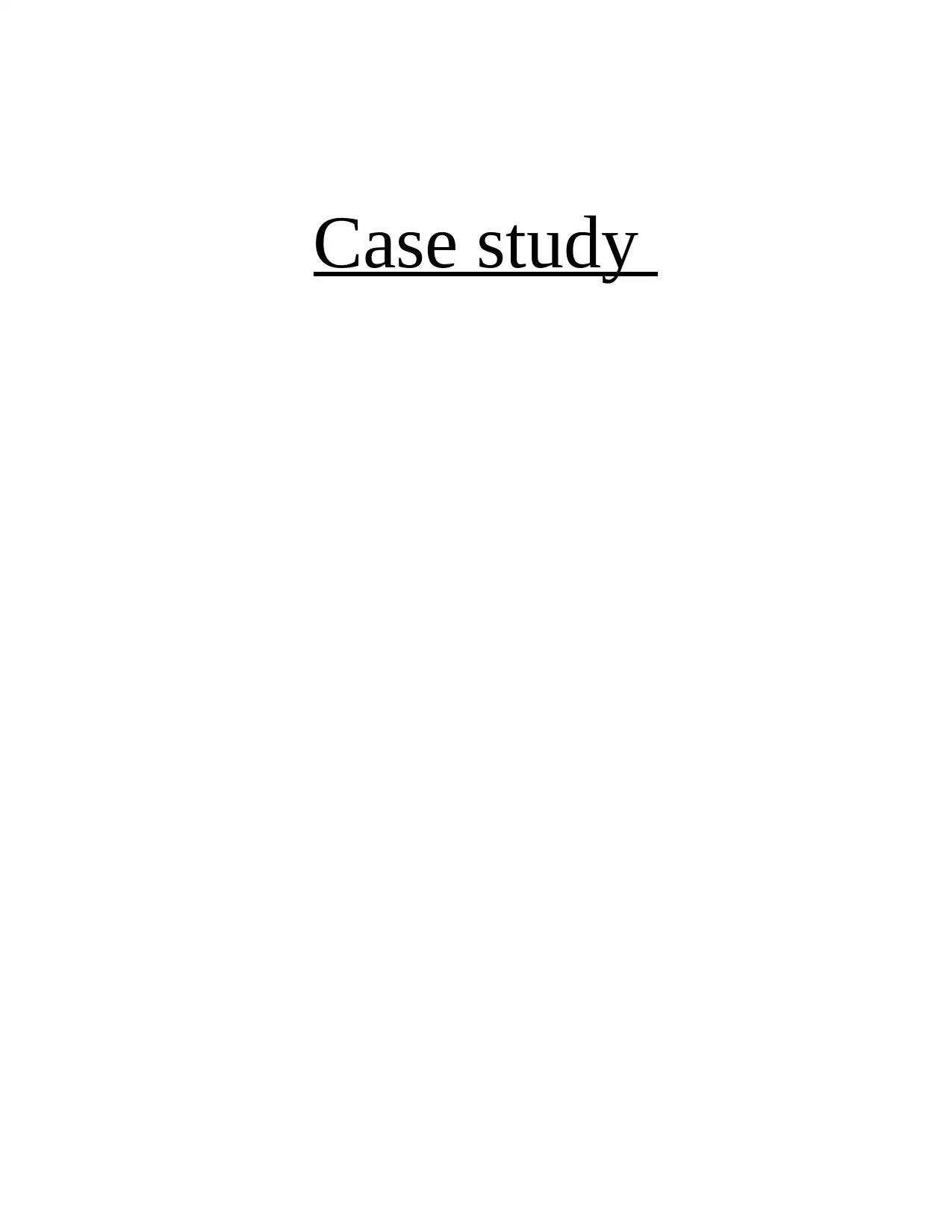
Case study
Paraphrase This Document
Need a fresh take? Get an instant paraphrase of this document with our AI Paraphraser
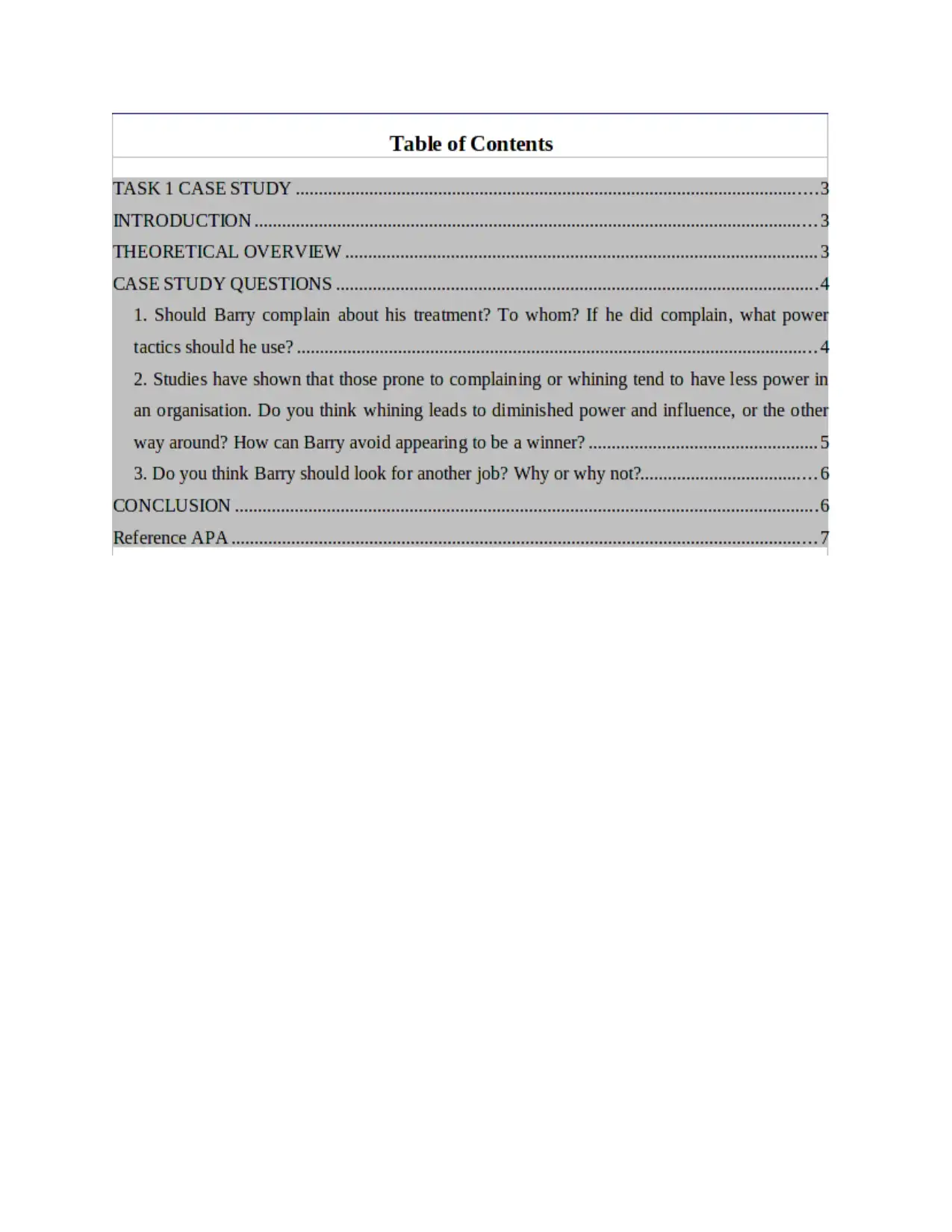
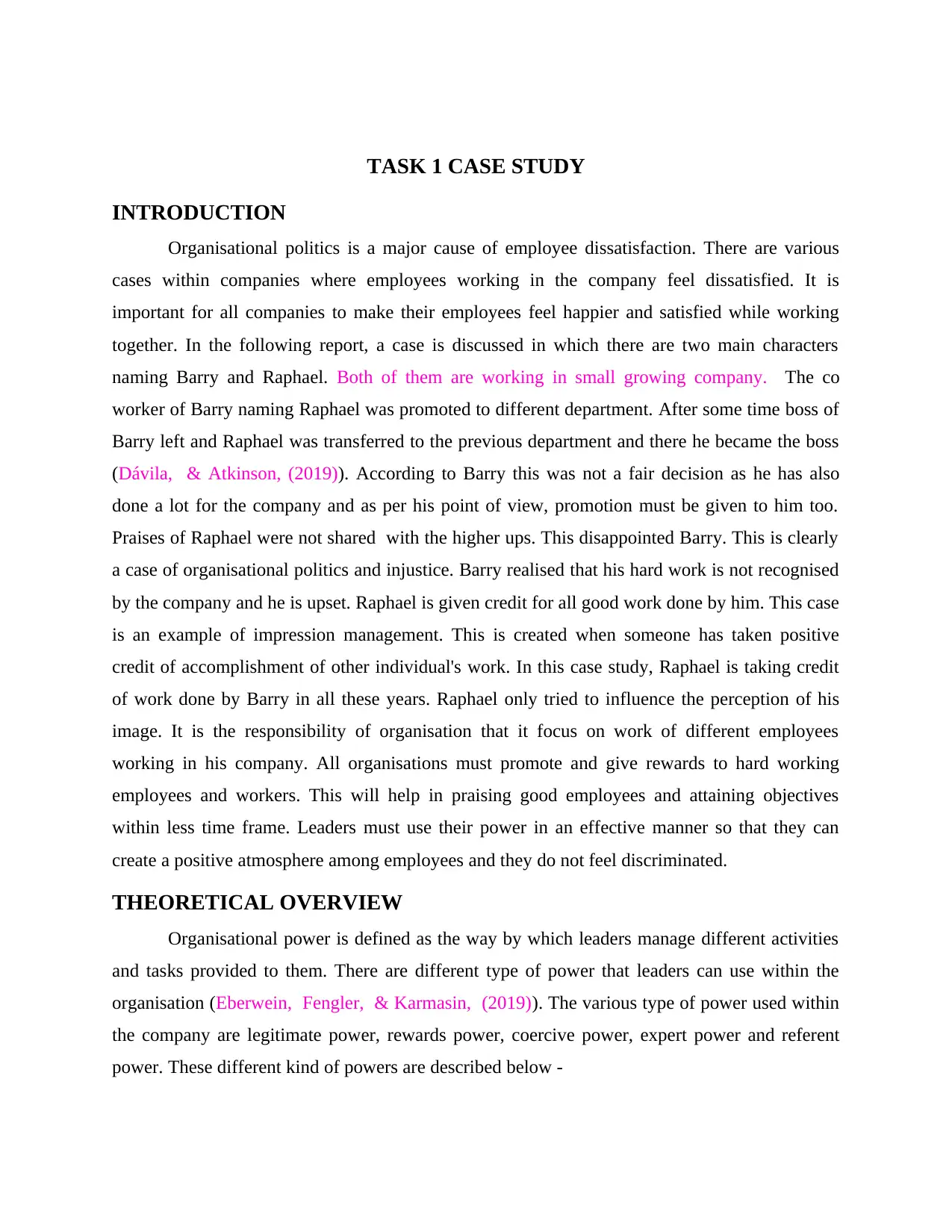
TASK 1 CASE STUDY
INTRODUCTION
Organisational politics is a major cause of employee dissatisfaction. There are various
cases within companies where employees working in the company feel dissatisfied. It is
important for all companies to make their employees feel happier and satisfied while working
together. In the following report, a case is discussed in which there are two main characters
naming Barry and Raphael. Both of them are working in small growing company. The co
worker of Barry naming Raphael was promoted to different department. After some time boss of
Barry left and Raphael was transferred to the previous department and there he became the boss
(Dávila, & Atkinson, (2019)). According to Barry this was not a fair decision as he has also
done a lot for the company and as per his point of view, promotion must be given to him too.
Praises of Raphael were not shared with the higher ups. This disappointed Barry. This is clearly
a case of organisational politics and injustice. Barry realised that his hard work is not recognised
by the company and he is upset. Raphael is given credit for all good work done by him. This case
is an example of impression management. This is created when someone has taken positive
credit of accomplishment of other individual's work. In this case study, Raphael is taking credit
of work done by Barry in all these years. Raphael only tried to influence the perception of his
image. It is the responsibility of organisation that it focus on work of different employees
working in his company. All organisations must promote and give rewards to hard working
employees and workers. This will help in praising good employees and attaining objectives
within less time frame. Leaders must use their power in an effective manner so that they can
create a positive atmosphere among employees and they do not feel discriminated.
THEORETICAL OVERVIEW
Organisational power is defined as the way by which leaders manage different activities
and tasks provided to them. There are different type of power that leaders can use within the
organisation (Eberwein, Fengler, & Karmasin, (2019)). The various type of power used within
the company are legitimate power, rewards power, coercive power, expert power and referent
power. These different kind of powers are described below -
INTRODUCTION
Organisational politics is a major cause of employee dissatisfaction. There are various
cases within companies where employees working in the company feel dissatisfied. It is
important for all companies to make their employees feel happier and satisfied while working
together. In the following report, a case is discussed in which there are two main characters
naming Barry and Raphael. Both of them are working in small growing company. The co
worker of Barry naming Raphael was promoted to different department. After some time boss of
Barry left and Raphael was transferred to the previous department and there he became the boss
(Dávila, & Atkinson, (2019)). According to Barry this was not a fair decision as he has also
done a lot for the company and as per his point of view, promotion must be given to him too.
Praises of Raphael were not shared with the higher ups. This disappointed Barry. This is clearly
a case of organisational politics and injustice. Barry realised that his hard work is not recognised
by the company and he is upset. Raphael is given credit for all good work done by him. This case
is an example of impression management. This is created when someone has taken positive
credit of accomplishment of other individual's work. In this case study, Raphael is taking credit
of work done by Barry in all these years. Raphael only tried to influence the perception of his
image. It is the responsibility of organisation that it focus on work of different employees
working in his company. All organisations must promote and give rewards to hard working
employees and workers. This will help in praising good employees and attaining objectives
within less time frame. Leaders must use their power in an effective manner so that they can
create a positive atmosphere among employees and they do not feel discriminated.
THEORETICAL OVERVIEW
Organisational power is defined as the way by which leaders manage different activities
and tasks provided to them. There are different type of power that leaders can use within the
organisation (Eberwein, Fengler, & Karmasin, (2019)). The various type of power used within
the company are legitimate power, rewards power, coercive power, expert power and referent
power. These different kind of powers are described below -
⊘ This is a preview!⊘
Do you want full access?
Subscribe today to unlock all pages.

Trusted by 1+ million students worldwide
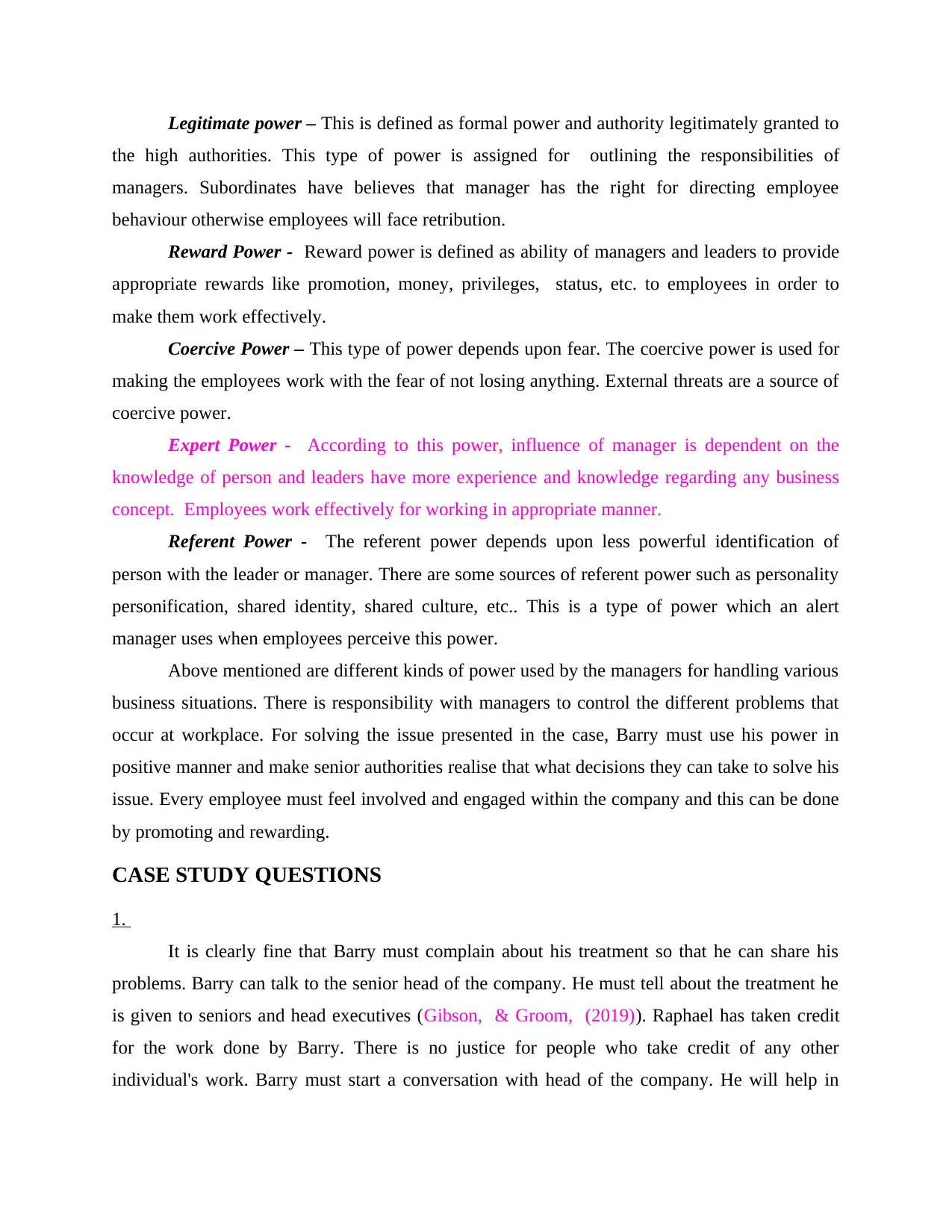
Legitimate power – This is defined as formal power and authority legitimately granted to
the high authorities. This type of power is assigned for outlining the responsibilities of
managers. Subordinates have believes that manager has the right for directing employee
behaviour otherwise employees will face retribution.
Reward Power - Reward power is defined as ability of managers and leaders to provide
appropriate rewards like promotion, money, privileges, status, etc. to employees in order to
make them work effectively.
Coercive Power – This type of power depends upon fear. The coercive power is used for
making the employees work with the fear of not losing anything. External threats are a source of
coercive power.
Expert Power - According to this power, influence of manager is dependent on the
knowledge of person and leaders have more experience and knowledge regarding any business
concept. Employees work effectively for working in appropriate manner.
Referent Power - The referent power depends upon less powerful identification of
person with the leader or manager. There are some sources of referent power such as personality
personification, shared identity, shared culture, etc.. This is a type of power which an alert
manager uses when employees perceive this power.
Above mentioned are different kinds of power used by the managers for handling various
business situations. There is responsibility with managers to control the different problems that
occur at workplace. For solving the issue presented in the case, Barry must use his power in
positive manner and make senior authorities realise that what decisions they can take to solve his
issue. Every employee must feel involved and engaged within the company and this can be done
by promoting and rewarding.
CASE STUDY QUESTIONS
1.
It is clearly fine that Barry must complain about his treatment so that he can share his
problems. Barry can talk to the senior head of the company. He must tell about the treatment he
is given to seniors and head executives (Gibson, & Groom, (2019)). Raphael has taken credit
for the work done by Barry. There is no justice for people who take credit of any other
individual's work. Barry must start a conversation with head of the company. He will help in
the high authorities. This type of power is assigned for outlining the responsibilities of
managers. Subordinates have believes that manager has the right for directing employee
behaviour otherwise employees will face retribution.
Reward Power - Reward power is defined as ability of managers and leaders to provide
appropriate rewards like promotion, money, privileges, status, etc. to employees in order to
make them work effectively.
Coercive Power – This type of power depends upon fear. The coercive power is used for
making the employees work with the fear of not losing anything. External threats are a source of
coercive power.
Expert Power - According to this power, influence of manager is dependent on the
knowledge of person and leaders have more experience and knowledge regarding any business
concept. Employees work effectively for working in appropriate manner.
Referent Power - The referent power depends upon less powerful identification of
person with the leader or manager. There are some sources of referent power such as personality
personification, shared identity, shared culture, etc.. This is a type of power which an alert
manager uses when employees perceive this power.
Above mentioned are different kinds of power used by the managers for handling various
business situations. There is responsibility with managers to control the different problems that
occur at workplace. For solving the issue presented in the case, Barry must use his power in
positive manner and make senior authorities realise that what decisions they can take to solve his
issue. Every employee must feel involved and engaged within the company and this can be done
by promoting and rewarding.
CASE STUDY QUESTIONS
1.
It is clearly fine that Barry must complain about his treatment so that he can share his
problems. Barry can talk to the senior head of the company. He must tell about the treatment he
is given to seniors and head executives (Gibson, & Groom, (2019)). Raphael has taken credit
for the work done by Barry. There is no justice for people who take credit of any other
individual's work. Barry must start a conversation with head of the company. He will help in
Paraphrase This Document
Need a fresh take? Get an instant paraphrase of this document with our AI Paraphraser
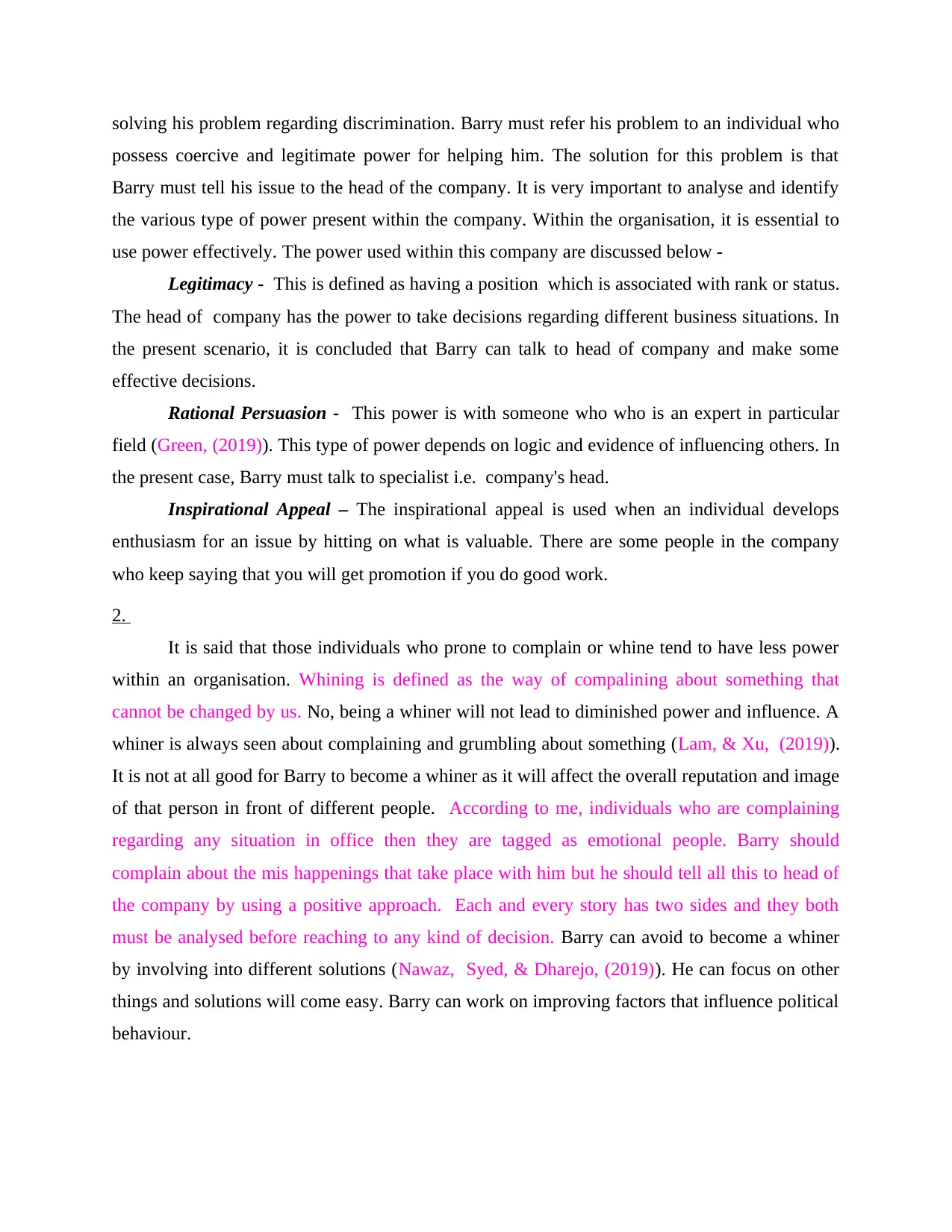
solving his problem regarding discrimination. Barry must refer his problem to an individual who
possess coercive and legitimate power for helping him. The solution for this problem is that
Barry must tell his issue to the head of the company. It is very important to analyse and identify
the various type of power present within the company. Within the organisation, it is essential to
use power effectively. The power used within this company are discussed below -
Legitimacy - This is defined as having a position which is associated with rank or status.
The head of company has the power to take decisions regarding different business situations. In
the present scenario, it is concluded that Barry can talk to head of company and make some
effective decisions.
Rational Persuasion - This power is with someone who who is an expert in particular
field (Green, (2019)). This type of power depends on logic and evidence of influencing others. In
the present case, Barry must talk to specialist i.e. company's head.
Inspirational Appeal – The inspirational appeal is used when an individual develops
enthusiasm for an issue by hitting on what is valuable. There are some people in the company
who keep saying that you will get promotion if you do good work.
2.
It is said that those individuals who prone to complain or whine tend to have less power
within an organisation. Whining is defined as the way of compalining about something that
cannot be changed by us. No, being a whiner will not lead to diminished power and influence. A
whiner is always seen about complaining and grumbling about something (Lam, & Xu, (2019)).
It is not at all good for Barry to become a whiner as it will affect the overall reputation and image
of that person in front of different people. According to me, individuals who are complaining
regarding any situation in office then they are tagged as emotional people. Barry should
complain about the mis happenings that take place with him but he should tell all this to head of
the company by using a positive approach. Each and every story has two sides and they both
must be analysed before reaching to any kind of decision. Barry can avoid to become a whiner
by involving into different solutions (Nawaz, Syed, & Dharejo, (2019)). He can focus on other
things and solutions will come easy. Barry can work on improving factors that influence political
behaviour.
possess coercive and legitimate power for helping him. The solution for this problem is that
Barry must tell his issue to the head of the company. It is very important to analyse and identify
the various type of power present within the company. Within the organisation, it is essential to
use power effectively. The power used within this company are discussed below -
Legitimacy - This is defined as having a position which is associated with rank or status.
The head of company has the power to take decisions regarding different business situations. In
the present scenario, it is concluded that Barry can talk to head of company and make some
effective decisions.
Rational Persuasion - This power is with someone who who is an expert in particular
field (Green, (2019)). This type of power depends on logic and evidence of influencing others. In
the present case, Barry must talk to specialist i.e. company's head.
Inspirational Appeal – The inspirational appeal is used when an individual develops
enthusiasm for an issue by hitting on what is valuable. There are some people in the company
who keep saying that you will get promotion if you do good work.
2.
It is said that those individuals who prone to complain or whine tend to have less power
within an organisation. Whining is defined as the way of compalining about something that
cannot be changed by us. No, being a whiner will not lead to diminished power and influence. A
whiner is always seen about complaining and grumbling about something (Lam, & Xu, (2019)).
It is not at all good for Barry to become a whiner as it will affect the overall reputation and image
of that person in front of different people. According to me, individuals who are complaining
regarding any situation in office then they are tagged as emotional people. Barry should
complain about the mis happenings that take place with him but he should tell all this to head of
the company by using a positive approach. Each and every story has two sides and they both
must be analysed before reaching to any kind of decision. Barry can avoid to become a whiner
by involving into different solutions (Nawaz, Syed, & Dharejo, (2019)). He can focus on other
things and solutions will come easy. Barry can work on improving factors that influence political
behaviour.
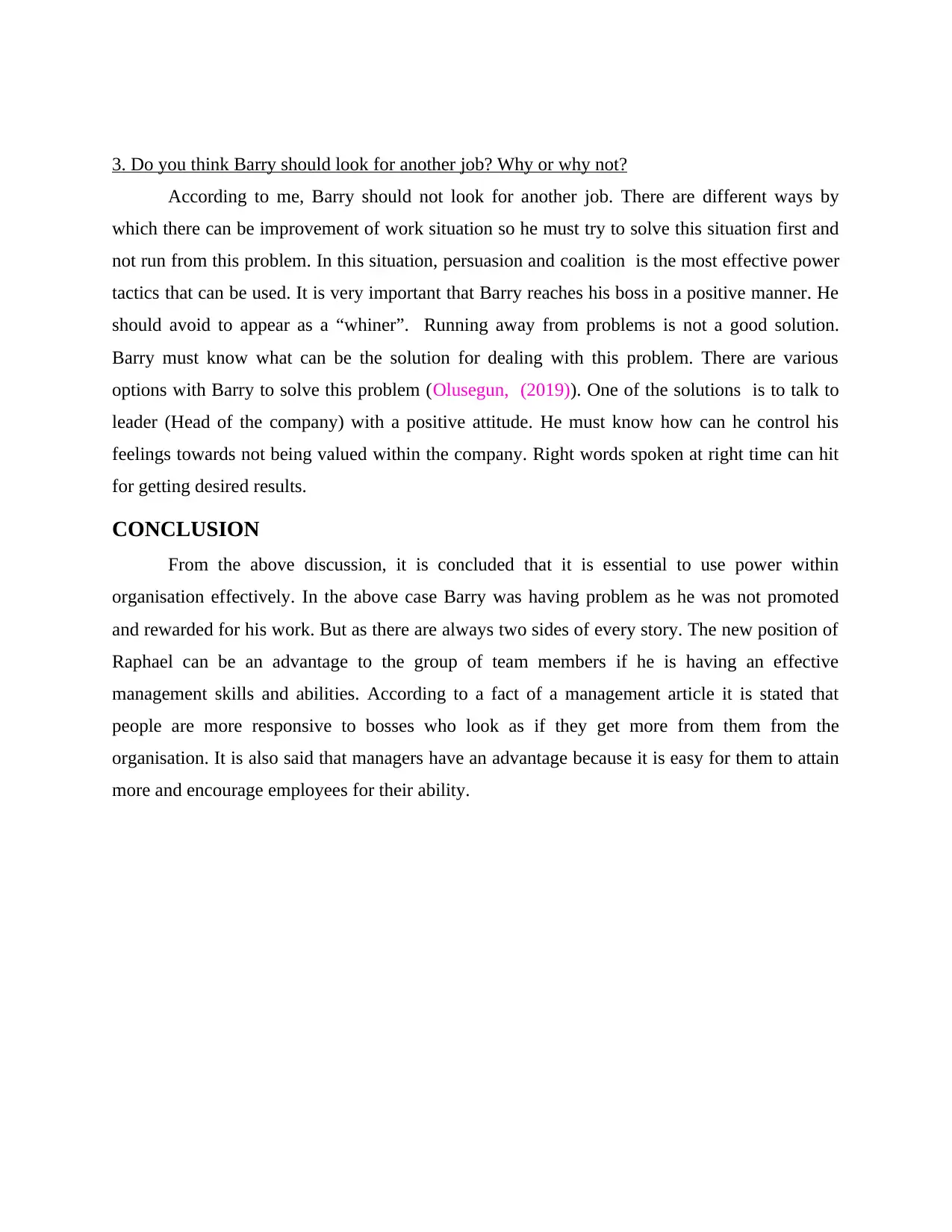
3. Do you think Barry should look for another job? Why or why not?
According to me, Barry should not look for another job. There are different ways by
which there can be improvement of work situation so he must try to solve this situation first and
not run from this problem. In this situation, persuasion and coalition is the most effective power
tactics that can be used. It is very important that Barry reaches his boss in a positive manner. He
should avoid to appear as a “whiner”. Running away from problems is not a good solution.
Barry must know what can be the solution for dealing with this problem. There are various
options with Barry to solve this problem (Olusegun, (2019)). One of the solutions is to talk to
leader (Head of the company) with a positive attitude. He must know how can he control his
feelings towards not being valued within the company. Right words spoken at right time can hit
for getting desired results.
CONCLUSION
From the above discussion, it is concluded that it is essential to use power within
organisation effectively. In the above case Barry was having problem as he was not promoted
and rewarded for his work. But as there are always two sides of every story. The new position of
Raphael can be an advantage to the group of team members if he is having an effective
management skills and abilities. According to a fact of a management article it is stated that
people are more responsive to bosses who look as if they get more from them from the
organisation. It is also said that managers have an advantage because it is easy for them to attain
more and encourage employees for their ability.
According to me, Barry should not look for another job. There are different ways by
which there can be improvement of work situation so he must try to solve this situation first and
not run from this problem. In this situation, persuasion and coalition is the most effective power
tactics that can be used. It is very important that Barry reaches his boss in a positive manner. He
should avoid to appear as a “whiner”. Running away from problems is not a good solution.
Barry must know what can be the solution for dealing with this problem. There are various
options with Barry to solve this problem (Olusegun, (2019)). One of the solutions is to talk to
leader (Head of the company) with a positive attitude. He must know how can he control his
feelings towards not being valued within the company. Right words spoken at right time can hit
for getting desired results.
CONCLUSION
From the above discussion, it is concluded that it is essential to use power within
organisation effectively. In the above case Barry was having problem as he was not promoted
and rewarded for his work. But as there are always two sides of every story. The new position of
Raphael can be an advantage to the group of team members if he is having an effective
management skills and abilities. According to a fact of a management article it is stated that
people are more responsive to bosses who look as if they get more from them from the
organisation. It is also said that managers have an advantage because it is easy for them to attain
more and encourage employees for their ability.
⊘ This is a preview!⊘
Do you want full access?
Subscribe today to unlock all pages.

Trusted by 1+ million students worldwide
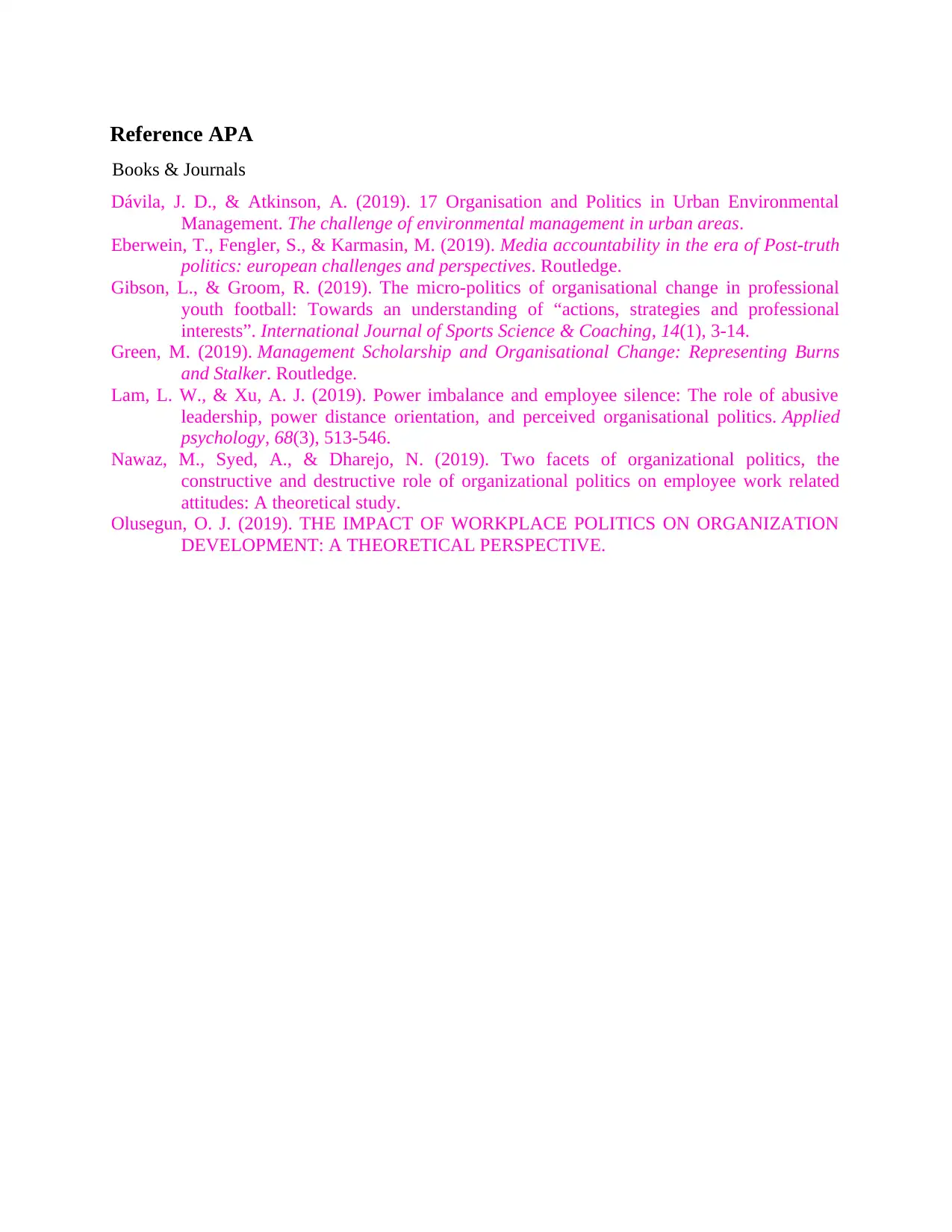
Reference APA
Books & Journals
Dávila, J. D., & Atkinson, A. (2019). 17 Organisation and Politics in Urban Environmental
Management. The challenge of environmental management in urban areas.
Eberwein, T., Fengler, S., & Karmasin, M. (2019). Media accountability in the era of Post-truth
politics: european challenges and perspectives. Routledge.
Gibson, L., & Groom, R. (2019). The micro-politics of organisational change in professional
youth football: Towards an understanding of “actions, strategies and professional
interests”. International Journal of Sports Science & Coaching, 14(1), 3-14.
Green, M. (2019). Management Scholarship and Organisational Change: Representing Burns
and Stalker. Routledge.
Lam, L. W., & Xu, A. J. (2019). Power imbalance and employee silence: The role of abusive
leadership, power distance orientation, and perceived organisational politics. Applied
psychology, 68(3), 513-546.
Nawaz, M., Syed, A., & Dharejo, N. (2019). Two facets of organizational politics, the
constructive and destructive role of organizational politics on employee work related
attitudes: A theoretical study.
Olusegun, O. J. (2019). THE IMPACT OF WORKPLACE POLITICS ON ORGANIZATION
DEVELOPMENT: A THEORETICAL PERSPECTIVE.
Books & Journals
Dávila, J. D., & Atkinson, A. (2019). 17 Organisation and Politics in Urban Environmental
Management. The challenge of environmental management in urban areas.
Eberwein, T., Fengler, S., & Karmasin, M. (2019). Media accountability in the era of Post-truth
politics: european challenges and perspectives. Routledge.
Gibson, L., & Groom, R. (2019). The micro-politics of organisational change in professional
youth football: Towards an understanding of “actions, strategies and professional
interests”. International Journal of Sports Science & Coaching, 14(1), 3-14.
Green, M. (2019). Management Scholarship and Organisational Change: Representing Burns
and Stalker. Routledge.
Lam, L. W., & Xu, A. J. (2019). Power imbalance and employee silence: The role of abusive
leadership, power distance orientation, and perceived organisational politics. Applied
psychology, 68(3), 513-546.
Nawaz, M., Syed, A., & Dharejo, N. (2019). Two facets of organizational politics, the
constructive and destructive role of organizational politics on employee work related
attitudes: A theoretical study.
Olusegun, O. J. (2019). THE IMPACT OF WORKPLACE POLITICS ON ORGANIZATION
DEVELOPMENT: A THEORETICAL PERSPECTIVE.
1 out of 7
Related Documents
Your All-in-One AI-Powered Toolkit for Academic Success.
+13062052269
info@desklib.com
Available 24*7 on WhatsApp / Email
![[object Object]](/_next/static/media/star-bottom.7253800d.svg)
Unlock your academic potential
Copyright © 2020–2026 A2Z Services. All Rights Reserved. Developed and managed by ZUCOL.





